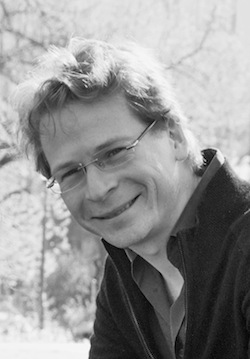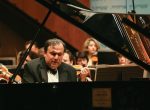Yefim Bronfman performs Johannes Brahms’s Piano Concerto No. 2 with the Vancouver Symphony Orchestra at the Orpheum Dec. 6 and 8. (photo from VSO)
“I don’t think it can be overstated, the significance of having an artist like Yefim Bronfman, like Yitzhak Perlman, who’s coming later in the season, as well. These are living legends in our field,” said Misha Aster, vice-president, artistic planning and production, at the Vancouver Symphony Orchestra, in a phone interview with the Independent.
“It’s a testament to the city and to the orchestra that artists of this stature take the time to visit with us,” he said. “But it’s also an occasion for us to celebrate their presence here because it’s unusual – it’s a rare opportunity to hear artists of this calibre and of this experience perform works that are landmarks of the repertoire.”
On Dec. 6 and 8 at the Orpheum, Bronfman and the orchestra will perform Johannes Brahms’s Piano Concerto No. 2. The concert also features Richard Strauss’s Don Juan and Franz Liszt’s Les preludes.
Initial discussions for the December performances took place about two-and-a-half years ago. That’s a long time, said Aster, “but, for an artist of his calibre, that’s generally what’s required to get a date fixed in his calendar.”
While Bronfman is in tremendous demand, Aster said, “He loves Vancouver, which helps. Every visit he has made here in the past, he has reiterated his affection for the city, and for the orchestra.”
The upcoming concerts are not just a musical highlight of the VSO season, said Aster, “but one of the flagship statements of our season.”
He added, “The program he’s coming with, as well – the Brahms Piano Concerto No. 2 – is considered one of the Everests of the repertoire. It’s not frequently performed. It’s a very large piece, a very demanding piece for the soloist and for the orchestra, as well; it has a major solo cello part.”
The choice of music for a program with a visiting artist is “a discussion,” said Aster. “It’s a dynamic process between soloist, conductor and orchestra. There’s a need for balance between those elements.”
Bronfman has performed the Brahms before. “The combination [of Bronfman] together with Jun Märkl, who is a much-beloved conductor here with the orchestra, made Brahms a possibility,” Aster said.
The other compositions in the December program – Strauss’s Don Juan and Liszt’s Les preludes – will be played by the orchestra on its own. “They all fit within a certain genre,” noted Aster of the works. “It’s not coincidental programming, by any means.”
Brahms and Liszt were contemporaries, he explained, “but at opposite poles of the spectrum when it came to musical development of the later 19th century and the debate over what was considered ‘program music,’ that was music meant to tell a story, that was reflective of a certain kind of dramatic narrative, as opposed to purely abstract music or symphonic music that had its roots in the more classical esthetic.”
The latter was Brahms’ approach, said Aster, whereas Liszt was a champion of “this new kind of programmatic approach to music.” And Strauss “was considered an heir to Liszt with respect to that, so both of those tone poems – Les preludes and Don Juan – are narrative works of program music, and they’re juxtaposed with this massive concerto by Brahms, which is Brahms’ reiteration of his musical principles.”

Aster arrived in Vancouver for his position at the VSO in mid-August. Born in Hamilton, Ont., he had been in Berlin almost 13 years. Prior to that, he was in Austria for a couple of years.
Aster trained as a violinist at the Royal Conservatory of Music in Toronto, and studied political science, history and dramaturgy at McGill University, the London School of Economics and Harvard University. In his career, he’s been based in Europe largely, but he has always kept in touch with Canada, he said, as his grandmother is in Toronto and his parents divide their time between Ontario and a base in Europe. Aster’s wife, Kinneret Sieradzki, is Israeli and the couple has a 2-year-old daughter, Laila.
In Germany, Aster was working as an executive producer at Deutsche Grammophon, the recording label Universal Music, and he maintains a role at the Gustavo Dudamel Foundation, where he was director of programs. His move to Vancouver marks the first time he has lived in Canada since he was a teenager.
“It’s a major orchestra in this country,” Aster said about what attracted him to the job with the VSO. “It’s a very important cultural player, certainly in Western Canada, and I remember, even growing up in Toronto, having a sense that important things were happening in musical life in Vancouver and that the VSO was a formidable force in Canadian music.”
Recently, the whole organization has undergone a significant transition, with longtime musical director Bramwell Tovey retiring. “It was the ending of an era and the beginning of something new,” said Aster. “I hadn’t met Otto Tausk, the new music director, before we began the process of discussing the possibility of my joining the team here but I was immediately impressed by him, by the integrity of his musicianship, by his vision for the orchestra.”
Aster also had a sense, he said, of Tausk “being very European in outlook, in disposition, in artistic values, in his connections and contacts.” This was a world with which Aster had been familiar for a long time, so he felt that “it would be an interesting opportunity” and that he “could be a helpful fit in that sense,” of being originally from Canada and having roots here, “but also, in a professional sense, of being very familiar with the environment from which Maestro Tausk comes. That chemistry was really the key.” Adding to that was the organization’s “ambition with respect to an artistic agenda but also what the orchestra intends to mean for the community.”
The VSO is “an incredibly busy organization,” said Aster. “We produce 150 concerts a year, which is a lot, in relative terms, compared to many other orchestras in the country. And it has to do with the fact that the orchestra has always had the mandate to address itself to a range of different communities and a range of different musical tastes in the city. Unlike many other major orchestras in the country, we perform in 15 different venues around Greater Vancouver through the season in various configurations, based out of our home in the Orpheum, where we have our major subscription series.”
Part of Aster’s job is to ensure that it’s “not just a functional run-out that we do to North Van or to Surrey with a program, but that what we’re trying to program for those communities and for venues in those communities reflects a point of access for them into the world of music that we represent.”
Tickets for Bronfman’s performance at the Orpheum range from $16.25 to $125 and can be purchased from vancouversymphony.ca.

